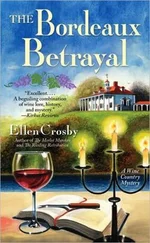After I gave a copy of the guest list to the officer who accompanied me to the villa, I dropped off the flashlights at the equipment barn. Another tan and gold cruiser was parked in front of the barn door. Two uniformed officers came out as I pulled up.
“Can I help you?” I asked. Hardly necessary. They’d already helped themselves.
“No, thanks, miss,” one of them said. “That door usually unlocked?”
“No, but we were working last night so we didn’t lock it.”
“And what brings you here now?”
I said evenly, “I’m dropping off a couple of boxes of flashlights we were using to mark the fields so the helicopter knew where to go.”
My answer seemed to satisfy him and they got in the Crown Victoria and drove off. I left the flashlights, locked up, and headed home. Would I find a cruiser there, too? Or maybe someone from the EPA?
Lord, was Bobby right? Could they really shut us down?
No car in the driveway. And no sign that anybody had been here, either. Relieved, I parked the Mini and went inside.
My home, Highland House, had been designed and built by my ancestor, Hamish Montgomery, in the early 1800s after he received five hundred acres from the sixth Lord Fairfax as a reward for distinguished service during the French and Indian War. The house was a pleasing combination of Federal and Georgian architecture, built mostly of locally quarried stone, except for the foundation. Those stones came from Goose Creek, which meandered through two counties—and our property—as it snaked its way to the Potomac River. According to family lore, Hamish had hauled them himself to the highest bluff on our land. There he’d watched the sun set in all its vivid glory behind the low-slung Blue Ridge Mountains, then sited his house so he’d always have that spectacular view.
Last year a fire had destroyed part of the first floor, but from the outside the place looked like it had for the last two centuries, as the fire had miraculously spared the stone façade. The Montgomery clan motto carved over the front door— Garde bien, which means protect well, defend well—was grimier, but still quite appropriately intact.
As I walked inside, I heard the answering machine’s monotonous chirp. One message. My brother, Eli, sounding garbled. He must have been calling from his mobile phone while he was on the road, because he kept fading in and out.
“It’s me. What the hell’s going on…heard about finding Georgia Greenwood dead at…on the news just now and I nearly drove off the…on my way to Hilton Head with Brandi and Hope for a week. You know I’d come home, but I don’t see what I could…were you, I’d be trying to cover my…so you really ought…”
The message ended there and he hadn’t called back to finish telling me what I really ought. As for the offer to change his beach plans and come home, the fake sincerity in that gesture was patented Eli. The way he was now. Since he married Brandi a few years ago, he had changed from the big-hearted brother I could count on no matter what to a self-absorbed stranger who decided what to do after calculating first what was in it for him. Sometimes I wondered what had happened to his conscience. He used to have one.
In fact, he used to care about a lot of things, like this house and the vineyard. Even after the fire, he’d been pretty blasé when I asked his opinion—whether I should restore it as it had always been or change it.
“Do whatever you want, Luce,” he’d said. “It’s your house now. You wanted it, you got it. I don’t have such great memories of growing up there, so you can dynamite it, for all I care.”
Eli, an architect, now lived in an eight-thousand-square-foot palace he’d built outside Leesburg for Brandi and their new daughter. My sister-in-law’s idea of “old” or “antique” meant anything still hanging in her closet from last season. She and Eli owned the latest-model everything. Clothes. Car. Gadgets. Eli didn’t know I’d heard that Brandi called Highland House “a great place, if you like funeral homes.”
Our sister, Mia, was equally indifferent. “This house is dead, Lucie. Full of ghosts. Why do you want to live here, anyway?” she asked. “It smells like old people ever since Mom died and really creeps me out. I don’t care what you do with it. I’m moving out for good after I graduate.”
So I’d hired a young interior designer who did not share my siblings’ anathema of the past, though I did decide, finally, that it was time for a change. Last fall I’d returned to Atoka after spending two years living in my mother’s family home in the south of France. While there I’d fallen in love with the sun-drenched Provençal colors of earth, sky, sea, and sand, and that’s what I wanted around me now. The transformation of Highland House was magical and I loved it.
As for the furniture, my budget wasn’t grand enough to replace the antiques destroyed in the fire, but we salvaged what we could, bringing any items that could be restored to my designer’s father, a retired carpenter who lived nearby in Culpeper. One by one, the pieces returned, gleaming with a burnished elegance I had not seen for many years.
Though the place was more sparsely furnished, I liked it better this way. It seemed less cluttered and more open. By the time we were finished, the old bones of the house were still evident, but the fustiness and burned smells embedded in the walls and furniture had vanished, replaced by the clean scent of polished wood, freshly cut flowers, and the calming fragrance of dried lavender.
Right now, though, a stiff drink appealed better than aromatherapy and counting to ten. I punched the delete button on the answering machine more savagely than I needed to. No point returning that call. I’d just have to listen to Eli tell me what I was doing wrong, and there’d be plenty of time for that. My watch read just after eleven a.m. Thirty hours with no sleep. I thought about that drink, then I thought about my aching muscles and the gritty tiredness in my eyes. I headed for the stairs and bed.
It had been another miracle that the grand circular staircase that Hamish had designed so it looked as if it were floating in midair had survived the fire structurally intact, when so much around it did not. The only repairs to the carved walnut banister involved replacing the newel post and a few singed balusters, but now it looked as good as new—or rather, as good as old.
When I got upstairs I checked Mia’s room, across the hall from mine. Her bed was made. No idea if she’d slept in it last night, since I hadn’t been home myself.
My bedroom, the former master bedroom suite, had also been completely transformed since the fire. The walls were painted a warm yellow that reminded me of the sunflower fields in France. I’d bought inexpensive unfinished furniture from a factory in North Carolina, which my designer had whitewashed. The result gave the room a Quaker-like simplicity and clean style. Inexpensive green, yellow, and cream-colored braided oval rugs covered the floor, and my one splurge—an antique wedding-ring quilt in faded sherbet-colored fabrics—lay across the four-poster double bed.
I pulled back the quilt and stripped off my clothes, leaving them on the floor. The moment my head hit the pillow I fell asleep, too tired to think about anything that had just happened. There would be enough time later to deal with all my problems. God knows, I had plenty of them. And they were just beginning.
I don’t know when the phone on my nightstand started ringing, but by the time I got to it the caller had given up. Outside my window, the light was dusky. I’d slept all day. A moment later it rang again. This time I answered right away.
“I figured you were there. How come you didn’t pick up the first time? I know you don’t have caller ID. You ducking calls? I hope you’re not avoiding me.”
Читать дальше












